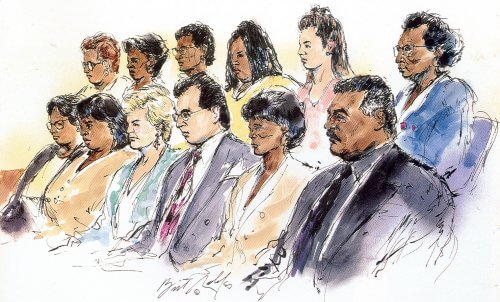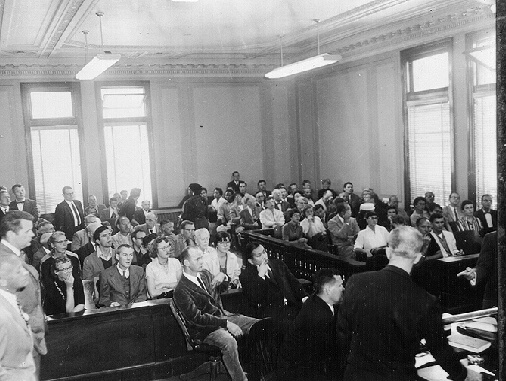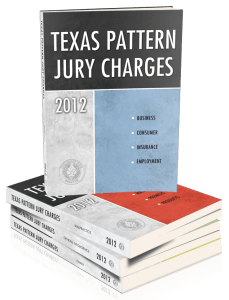Can a defendant waive his constitutional right to trial by six jurors (in County Court)?
 The United States Supreme Court has held that a state-law scheme that imposed a jury of fewer than six members upon a defendant, even one accused of only a misdemeanor offense, violates the Sixth Amendment right to a jury trial. Ballew v. State, 435 U.S. 223 (1978). For Texans, Article V, Section 17, of the Texas Constitution provides: “A jury in the County Court shall consist of six persons [.]” Furthermore, Section 62.301 of the Texas Government Code provides, without explicit exception, that a jury in a County Court “is composed of six persons.” Conspicuously, the similar Government Code provision (Section 62.201) requiring a 12-person jury in a District Court contains an exception that allows the parties to dispense with the full complement of jurors.
The United States Supreme Court has held that a state-law scheme that imposed a jury of fewer than six members upon a defendant, even one accused of only a misdemeanor offense, violates the Sixth Amendment right to a jury trial. Ballew v. State, 435 U.S. 223 (1978). For Texans, Article V, Section 17, of the Texas Constitution provides: “A jury in the County Court shall consist of six persons [.]” Furthermore, Section 62.301 of the Texas Government Code provides, without explicit exception, that a jury in a County Court “is composed of six persons.” Conspicuously, the similar Government Code provision (Section 62.201) requiring a 12-person jury in a District Court contains an exception that allows the parties to dispense with the full complement of jurors.
So what is the rule? Must a County Court jury have six or can it have less? The Supreme Court and the Texas Constitution and statutes call for six jurors in a misdemeanor criminal trial. But may the defendant waive this requirement? This issue was recently decided by the Texas Court of Criminal Appeals in Ex Parte Garza.
In Ex Parte Garza, the defendant was set to be tried for misdemeanor DWI when one of the six petit jurors became ill and was hospitalized. The trial court continued the case for a few days in hopes that the ailing juror would recover, but he did not. The trial court then entertained the option of granting a mistrial for manifest necessity. The defense objected to the mistrial, stating that it has the jury that it wanted to hear the case. The defense requested another continuance or, in the alternative, to proceed to trial without the ailing juror. The trial judge denied the continuance and did not address the option of proceeding with fewer than six jurors. The trial court then granted a sua sponte mistrial over the defense objection.
When the case was reset for trial, the defendant filed a pre-trial application for writ of habeas corpus, alleging that because the trial court prematurely terminated the prior proceedings without having considered a less drastic alternative, his right against double jeopardy was violated. The trial court denied relief, but the 1st District Court of Appeals (Houston) reversed. “The Court of Appeals concluded that the trial court erred not to explore the less drastic alternative of conducting the trial without the full complement of six jurors.”
The CCA now affirms the judgment of the 1st Court of Appeals. Writing for the majority, Judge Price explained:
Once a defendant shows he is being tried for the same offense after declaration of a mistrial, to which he objected, a heavy burden shifts to the State to justify the trial court’s declaration of the mistrial. The State must demonstrate a “manifest necessity” for a mistrial, which is to say a “high degree” of necessity, and the trial court’s discretion to declare a mistrial based on manifest necessity is limited to, and must be justified by, extraordinary circumstances. That discretion is abused, we have said, whenever the trial court declares a mistrial without first considering the availability of less drastic alternatives and reasonably ruling them out.
Regarding whether the trial court could have proceeded with only five jurors (as a less drastic alternative the mistrial), the CCA noted that “this Court and its predecessor, the Texas Court of Appeals, have held for more than a century that the Code of Criminal Procedure does at least implicitly permit waiver of the right to six jurors in cases tried in County Court.” Quoting the Supreme Court in Ballew:
To deny [the accused] his power to [waive his right to a six person jury] is to convert a privilege into an imperative requirement.
Imposing such a requirement on Texas defendants was not something the CCA is willing to do. Citing a long history of cases dating back to the early 1900s, the CCA noted how Texas has consistently allowed a defendant to waive his right to trial by a full complement of jurors. Therefore, the CCA held that by terminating the trial proceedings without considering whether to allow the trial to proceed with five jurors, the trial court abused its discretion. Accordingly, a new trial is jeopardy barred.
Takeaway: Consistent with Texas jurisprudence for the last 120 years, a defendant may waive his right to trial by six jurors in a County Court and proceed with less than the full amount.
Presiding Judge Keller and Judge Cochran dissented without opinion.

 Every level of criminal offense in Texas has a corresponding punishment range for the jury to consider. With the exception of enhancements or other minor differences, the Texas punishment ranges are as follows:
Every level of criminal offense in Texas has a corresponding punishment range for the jury to consider. With the exception of enhancements or other minor differences, the Texas punishment ranges are as follows:

 “I want a hamburger…no, a cheeseburger.”
“I want a hamburger…no, a cheeseburger.”
 The Sixth Amendment of the United States Constitution guarantees an accused the right to a public trial in all criminal prosecutions.
The Sixth Amendment of the United States Constitution guarantees an accused the right to a public trial in all criminal prosecutions.
 After the defendant was convicted in the case of
After the defendant was convicted in the case of 
 If a criminal defendant takes the stand during trial on the merits and denies culpability, but then, after being convicted, chooses not to testify during the punishment phase of the trial, may the prosecutor comment during closing that the defendant has “not taken responsibility for the crime?”
If a criminal defendant takes the stand during trial on the merits and denies culpability, but then, after being convicted, chooses not to testify during the punishment phase of the trial, may the prosecutor comment during closing that the defendant has “not taken responsibility for the crime?”
 The general rule is that the defendant is to be tried only for the offense charged, not for any other crimes or for being a criminal generally. However, evidence of extraneous acts of misconduct may be admissible if (1) the uncharged act is relevant to a material issue in the case, and (2) the probative value of that evidence is not significantly outweighed by its prejudicial effect. Because the propensity to commit crimes is not a material fact in a criminal case, Texas Rule of Evidence 404(b) explicitly prohibits the admission of uncharged acts to prove conduct in conformity with a bad character.
The general rule is that the defendant is to be tried only for the offense charged, not for any other crimes or for being a criminal generally. However, evidence of extraneous acts of misconduct may be admissible if (1) the uncharged act is relevant to a material issue in the case, and (2) the probative value of that evidence is not significantly outweighed by its prejudicial effect. Because the propensity to commit crimes is not a material fact in a criminal case, Texas Rule of Evidence 404(b) explicitly prohibits the admission of uncharged acts to prove conduct in conformity with a bad character.
 As I was perusing my typical news sources this morning, I came across
As I was perusing my typical news sources this morning, I came across 
 Blackshear v. State (link not working for now) 14th District Court of Appeals (Houston) 2011.
Blackshear v. State (link not working for now) 14th District Court of Appeals (Houston) 2011.
 The United States Supreme Court has held that a state-law scheme that imposed a jury of fewer than six members upon a defendant, even one accused of only a misdemeanor offense, violates the Sixth Amendment right to a jury trial. Ballew v. State, 435 U.S. 223 (1978). For Texans, Article V, Section 17, of the Texas Constitution provides: “A jury in the County Court shall consist of six persons [.]” Furthermore, Section 62.301 of the Texas Government Code provides, without explicit exception, that a jury in a County Court “is composed of six persons.” Conspicuously, the similar Government Code provision (Section 62.201) requiring a 12-person jury in a District Court contains an exception that allows the parties to dispense with the full complement of jurors.
The United States Supreme Court has held that a state-law scheme that imposed a jury of fewer than six members upon a defendant, even one accused of only a misdemeanor offense, violates the Sixth Amendment right to a jury trial. Ballew v. State, 435 U.S. 223 (1978). For Texans, Article V, Section 17, of the Texas Constitution provides: “A jury in the County Court shall consist of six persons [.]” Furthermore, Section 62.301 of the Texas Government Code provides, without explicit exception, that a jury in a County Court “is composed of six persons.” Conspicuously, the similar Government Code provision (Section 62.201) requiring a 12-person jury in a District Court contains an exception that allows the parties to dispense with the full complement of jurors. It seems like all I write about anymore is the Court of Criminal Appeals reversing a Court of Appeals case and siding with the State. Well, this post is no different.
It seems like all I write about anymore is the Court of Criminal Appeals reversing a Court of Appeals case and siding with the State. Well, this post is no different.





